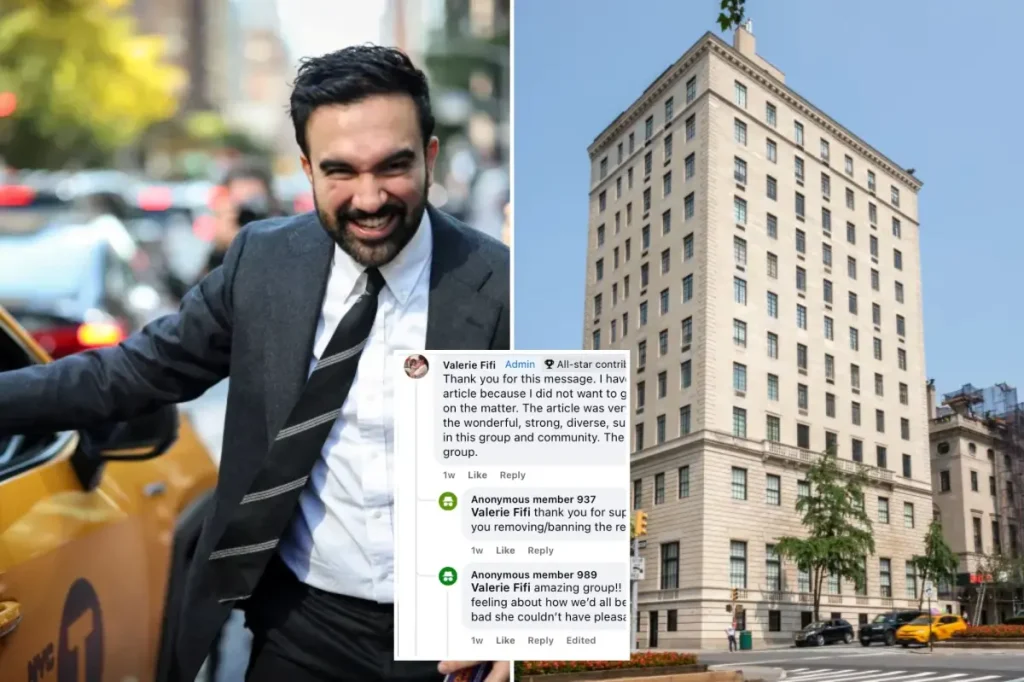Manhattan Moms Clash on Social Media Over New Mayor
In the leafy, affluent streets of Manhattan’s Upper East Side, a political firestorm has erupted among local mothers, transforming normally placid Facebook groups into battlegrounds of heated debate. What began as private discussions in two community groups—Moms of the Upper East Side (MUES) and UES Mommas—has spilled into public view through a controversial New York magazine article detailing the neighborhood’s reaction to the election of Zohran Mamdani as mayor. These online forums, typically dedicated to discussions about nannies, schools, and stroller recommendations, have become proxy war zones reflecting deeper divides in one of America’s wealthiest neighborhoods. With over 35,000 members, the MUES group has seen hundreds of posts from concerned parents, some threatening to flee to Florida or New Jersey in response to Mamdani’s democratic socialist platform, while others have accused their neighbors of Islamophobia and overreaction.
The digital discord reached such intensity that group administrators were forced to implement new rules prohibiting anonymous attacks on fellow members. One mother’s post captured the panic: “With all my love for NYC I can’t believe 50% +- of the city voted for this joker,” followed by inquiries about who was actually planning to leave the city. Over 300 responses flooded in, with many claiming they were considering relocations to neighboring states. Some commenters made alarming predictions about Mamdani’s public transportation proposals, suggesting that free buses would lead to increased violent crime. This catastrophizing was met with fierce pushback from other group members who labeled such concerns as overblown or rooted in prejudice, with one member directly stating, “It IS racist to just be mad that your new mayor is a Muslim.” The tension between these factions reflects broader political divisions, particularly notable in a neighborhood that had voted for Andrew Cuomo by a 24-point margin in previous elections.
Among those featured prominently in the New York magazine article was Robyn Reiter, a physical therapist and single mother raising a 13-year-old son. Reiter expressed profound concerns about Mamdani’s positions, writing in the MUES group, “We are literally terrified that a mayor who won’t condemn Hamas and won’t condemn the phrase ‘Globalize the Intifada’ is now running the city with the second largest Jewish population in the world.” In a follow-up interview, she elaborated on her fears: “It feels very immoral to me at this moment to pay tax dollars to a city that just elected someone who would love to see my people murdered. We’re all looking for an out, because I can’t jeopardize the safety of my son.” Reiter mentioned considering a move to Hoboken, New Jersey, though she later expressed frustration to The Post about how she was portrayed in the article, saying she was depicted as a “hysterical rich woman” rather than as a “smart and hardworking Jewish woman” with legitimate safety concerns for her Jewish son in the current climate.
The fallout from the article has left many feeling misrepresented and stereotyped. Reiter reported having to make her social media profiles private due to the “hatred” she received after the publication, emphasizing that as a single mother working 10-hour days, she doesn’t fit the “rich mom” caricature presented. MUES moderator Valerie Iovino shared similar sentiments with The Post, criticizing the article for reducing “a group of 35,000+ diverse women—a small fraction of which engaged in an important debate and conversation—into caricatures based on their own stereotypes of Upper East Side women.” Iovino defended her group’s diversity, noting that MUES includes “members with a wide range of political views, and a full spectrum of religious, socioeconomic, and racial backgrounds,” yet the article “flattened the entire community into a two-dimensional image of Marie Antoinette clutching her pearls.”
The controversy has created an atmosphere where many neighborhood mothers are reluctant to publicly share their political views. When approached by The Post, one stylishly dressed mother pushing a baby stroller refused to comment on the record, though she muttered under her breath, “I f—ing hate that man,” referring to Mamdani. She mentioned that while she doesn’t use Facebook or belong to either of the groups mentioned, her strong feelings mirror those expressed online. This reluctance to speak openly highlights the increasingly charged nature of political discourse, even in private community spaces. The tension extends beyond just the Upper East Side—on the traditionally liberal Upper West Side, members of the UWS Mommas Facebook group were also discussing relocation options, with one member advertising real estate connections for those considering moves to Florida.
For those willing to speak publicly, the concerns often extend beyond typical political differences to what they perceive as existential threats. Samantha Ettus, a Jewish activist and mother of three who grew up on the Upper East Side, told The Post that while she’s not a member of the Facebook groups in question, she shares the concerns about Mamdani’s leadership. “For many Jews that are paying attention, we see what’s going on and we see the patterns,” Ettus explained. “We see how closely the environment for Jews across the world right now resembles the pre-World War II environment, and it’s a time where we can’t afford to make great mistakes.” This sentiment encapsulates the heightened stakes many feel in what might otherwise be dismissed as typical neighborhood social media drama. What began as private conversations among mothers has evolved into a revealing window into how national politics and global concerns manifest in local communities, even in the digital spaces ostensibly created for sharing parenting tips and neighborhood resources.


